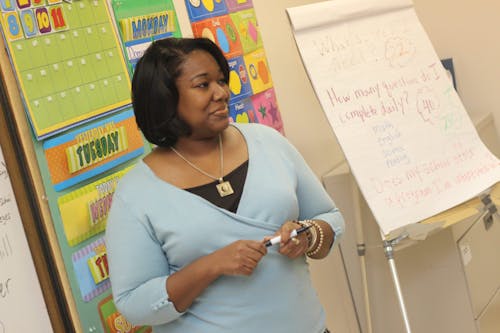These are the 10 things that I wish I knew as a first year (or new) teacher.
- Do something for yourself. You don't want to burn out. There are times when you will feel overwhelmed. That's normal. Be sure to detach from work at least once a week where you aren't doing any work. Watch a good movie. Get a hobby. Get a massage. Go out with friends. JUST DETACH!
- Make a schedule for yourself. Break things down into bite size pieces. Staying late frequently can cause you to burn out. A sample schedule could be:
- Do lesson plans on Sunday.
- Stay late on Tuesday to get other odds and ends done.
- Straighten/clean up your classroom on Wednesday.
- Grade papers on Thursday.
- Detach from work on Saturday.
- Call parents when students are doing well, not just when they are misbehaving or struggling. Often parents are on the defensive when they receive a phone call from the school/teacher. This helps to break down barriers and develop a relationship with the parents.
- Become a part of a Professional Learning Community (PLC). Find other educators that teach the same content/grade level as you. Find other educators that may have had difficulties (and have overcome) in something that you are struggling with. For example, go to Twitter and search the hashtag #ESOL or #SurfaceAreaLessons, etc. This will help you to see that you are not alone and that you aren't the only educator going through difficulties.
- Find a seasoned educator to be your mentor and meet with them 1-2 times a month. Seasoned educators can be your saving grace. They can provide guidance, tips, tricks, suggestions, etc.
- Have them do an informal observation so that they can give you advice on a lesson.
- Have them review lesson plans or activities that you have planned.
- Go and observe the seasoned educator. He/she may have some techniques that you can use.
- Meet with them regularly to ensure you are following school/district protocols, you are on track to meet deadlines, you have the resources you need or how to obtain them, among others.
- Seek out professional development. An effective educator never stops learning. Many school districts require professional development for recertification. Professional development not only helps to improve your craft, but will help to increase your salary. I highly recommend participating in professional development in your areas of weakness sooner, rather than later. Two professional development classes I took on Classroom Management are Cooperative Discipline and Conscious Classroom Management. Both transformed my classroom. I still use the books from these classes as resources.
- Give names or numbers to your reading groups and/or group tables and seats. You can call table groups numbers to line up, award points, or something of the like. Within each table group (quads), I number the desks 1 through 4. Then i can call all of the number 1's to line up or pick up materials, etc. When I hold groups, I have had either 3 groups or 4. When I did 3 groups, I called them "Earth", "Wind", and "Fire". When I have 4 groups, I use "Accomplished", "Achievers", "Intellects", and "Scholars". I've seen other educators use sports team names and colors.
- Develop a relationship with the students. Get to know your students. Ask about their families/friends. What foods do they like to eat? What movies are they watching? What kind of music do they listen to? Our students just want to know that you care about them. If they sense that, they will work harder in your class. If they are bilingual, try to learn some words/phrases in their language.
- Spend 2 minutes each day with your trouble or disruptive student(s) talking to them and getting to know them. If you have a student that doesn't follow directions, is disrespectful or something like that, talk to them for 2 minutes everyday for 10-15 days. This will help you to develop a relationship with them and eventually will change or curve that undesirable behavior.
- Use call and response or other attention grabbers. I found some attention grabbers on Pinterest. I use attention grabbers to bring the class back to order, to interrupt them (for a second) to make an announcement during group work, or if they are getting too loud. Some examples are:
- I say "Holy Moly". The students say "Guacamole".
- I say "All Set". The students say "You Bet".
- I raise my hand. When a student sees my hand raised, they raise their hands too. As students see hands raised, they will imitate.
- I count down from 5 to 1. If you count up, the students don't know what their limit is.
- If the students are in the middle of class discussion, I say "I need your attention in 3, wrap up your discussion in 2, bring it back in 1, thank you for your attention.

